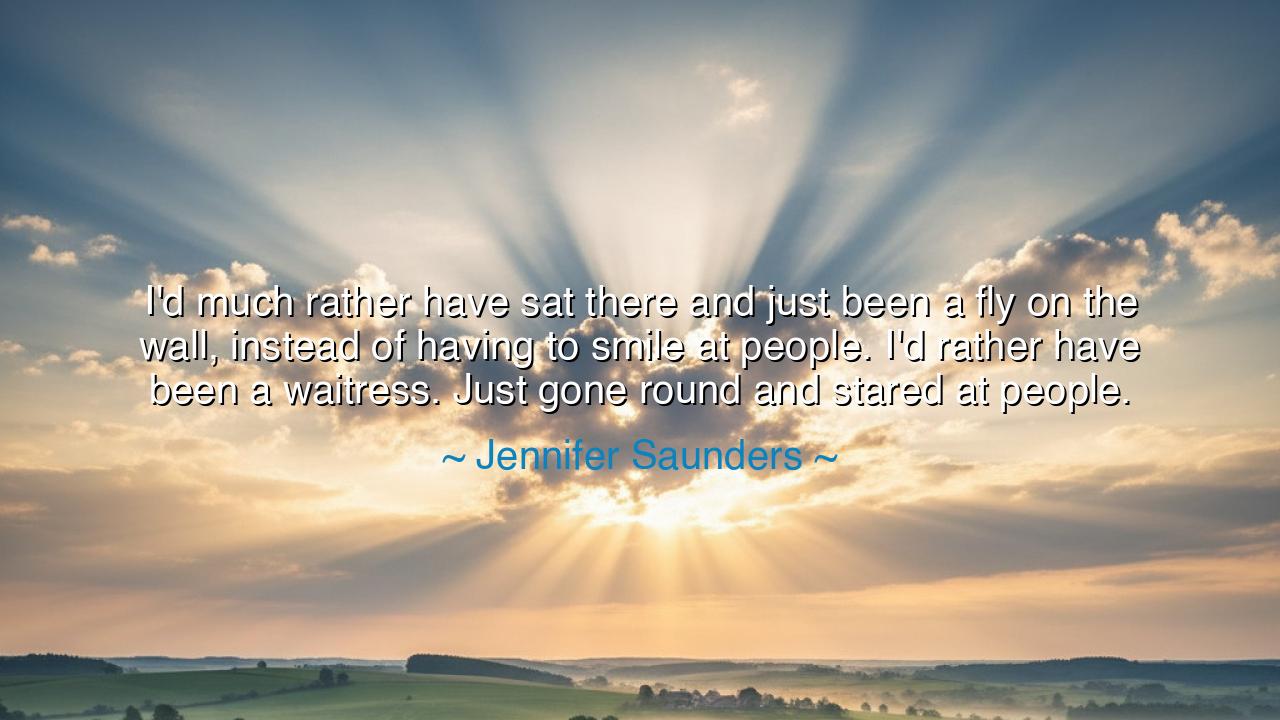
I'd much rather have sat there and just been a fly on the wall
I'd much rather have sat there and just been a fly on the wall, instead of having to smile at people. I'd rather have been a waitress. Just gone round and stared at people.






In the words of Jennifer Saunders, spoken with humor yet edged with truth, we find a reflection on the burden of expectation: “I'd much rather have sat there and just been a fly on the wall, instead of having to smile at people. I'd rather have been a waitress. Just gone round and stared at people.” This simple confession reveals a universal struggle—the tension between the demand to perform for others and the quiet longing to simply observe, to be present without pretense. For in her words, the ancient wisdom emerges: there are times when the mask of the smile weighs heavier than any crown.
The fly on the wall—that unseen witness, silent and unnoticed—represents freedom. To watch without being watched, to listen without having to reply, is a form of liberation. It spares the soul the weight of expectation, the burden of forced charm. Saunders speaks for all who have ever stood in a crowded hall, obliged to wear a grin while their spirit longed for stillness and truth. To wish to be the observer instead of the performer is not weakness, but honesty; it is the recognition that presence does not always require performance.
The image of the waitress, moving through the room with her tray, is equally profound. She is among the people but not of their world of pretense. She sees them as they are—unguarded, unaware, unpolished. To serve while watching is to learn the hidden language of humanity. Indeed, many of history’s wisest figures have chosen the role of servant or observer, preferring the vantage point of humility over the spotlight of glory. For wisdom is gathered not only by speaking, but by watching in silence.
Consider the story of the young Abraham Lincoln, who, before he was known as a statesman, worked in taverns and shops, watching the faces of farmers, travelers, and merchants. He served them, listened quietly to their talk, and from those countless hours of observation, he gained the insight into human nature that would one day guide a nation. Like Saunders imagining herself as a waitress, Lincoln too learned that one can see more of the world by standing just outside the circle of performance, quietly gathering truth.
The wisdom in Saunders’ words is not a rejection of people, but of false performance. To smile at people when the heart feels no joy is to wear a mask that dulls the soul. It is better to step aside, to find one’s own way of being present, than to betray the self with hollow gestures. The world praises extroversion and charm, but those who see quietly, those who listen deeply, are no less valuable. Indeed, their gift is often greater—for they discern what others miss.
The lesson for us, then, is clear: do not be enslaved by the demand to please. If your spirit longs to observe, allow yourself that freedom. If you find no truth in the forced smile, let your authenticity speak in silence. Choose roles in life that allow you to remain true, whether in serving, in listening, or in watching with patience. For sometimes the greatest wisdom is gathered not by the one at the center of attention, but by the one who sits quietly at the edge, watching and learning.
So, beloved, remember this: you need not always shine, nor always smile, nor always perform. Sometimes it is nobler to watch than to speak, to learn than to entertain, to serve rather than to be served. In this balance lies the fullness of life. Be willing, as Jennifer Saunders taught, to step back, to be the fly on the wall when your soul demands it. For in the stillness of observation, you may gather treasures of wisdom far richer than the applause of any crowd.






AAdministratorAdministrator
Welcome, honored guests. Please leave a comment, we will respond soon